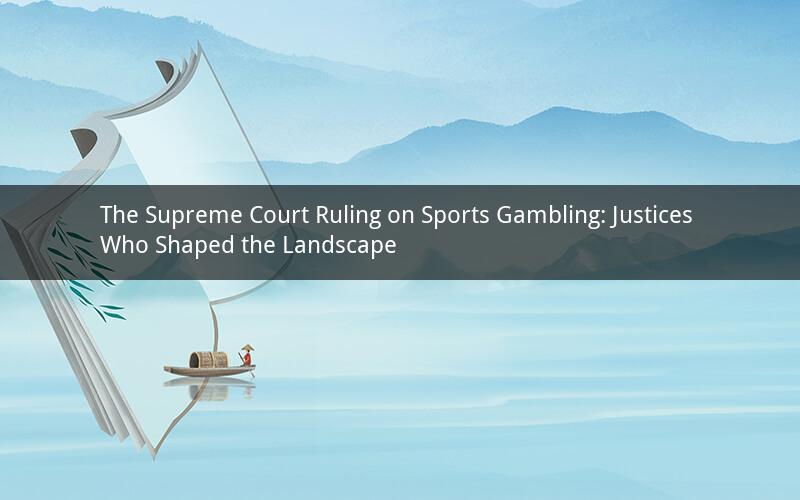
Introduction:
The Supreme Court's landmark decision to strike down the Professional and Amateur Sports Protection Act (PASPA) in 2018 opened the floodgates for sports gambling across the United States. This article delves into the justices who voted to allow sports gambling and the implications of their decision.
1. The Supreme Court Decision:
In May 2018, the Supreme Court ruled in favor of New Jersey in the case of Murphy v. National Collegiate Athletic Association (NCAA). The Court held that PASPA, which prohibited states from authorizing sports betting, violated the 10th Amendment by infringing on state sovereignty. This decision paved the way for legal sports gambling to flourish in states that chose to regulate it.
2. The Justices Who Voted to Allow Sports Gambling:
The majority opinion in Murphy v. NCAA was authored by Justice Samuel Alito, with the support of Chief Justice John Roberts, Justice Anthony Kennedy, Justice Clarence Thomas, and Justice Neil Gorsuch. These five justices collectively voted to allow sports gambling in the United States.
3. Justice Samuel Alito:
Justice Samuel Alito, a conservative justice appointed by President George W. Bush in 2006, wrote the majority opinion in Murphy v. NCAA. Alito emphasized that PASPA violated states' rights by dictating their policies on sports gambling. His opinion was instrumental in securing the Court's ruling to strike down PASPA.
4. Chief Justice John Roberts:
Chief Justice John Roberts, who was appointed by President George W. Bush in 2005, joined the majority opinion authored by Justice Alito. Roberts has a history of supporting states' rights and federalism, which played a role in his vote to allow sports gambling.
5. Justice Anthony Kennedy:
Justice Anthony Kennedy, who retired in 2018, was a pivotal figure in the majority opinion. Kennedy's vote was crucial, as he was often the swing vote in close cases. His support for states' rights and federalism contributed to the Court's decision to allow sports gambling.
6. Justice Clarence Thomas:
Justice Clarence Thomas, a conservative justice appointed by President George H.W. Bush in 1991, joined the majority opinion. Thomas has consistently advocated for states' rights and limited federal government power, which influenced his vote to allow sports gambling.
7. Justice Neil Gorsuch:
Justice Neil Gorsuch, a conservative justice appointed by President Donald Trump in 2017, also voted to allow sports gambling. Gorsuch's appointment to the Supreme Court has added a conservative voice to the Court, which may have influenced the outcome in Murphy v. NCAA.
8. Implications of the Decision:
The Supreme Court's decision to allow sports gambling has had significant implications for the United States. Here are some key points:
a. Economic Impact: Legal sports gambling has generated billions of dollars in revenue for states that have chosen to regulate it. This revenue has been used to fund various initiatives, such as education and infrastructure projects.
b. Competition: The decision has led to increased competition among sports betting operators, which has driven innovation and improved user experience for consumers.
c. Consumer Protection: States have implemented regulations to protect consumers from fraud, underage gambling, and other risks associated with sports betting.
d. Integrity of Sports: Some critics argue that legal sports gambling could lead to corruption in sports. However, the Supreme Court's decision to allow states to regulate sports betting has helped mitigate this concern.
e. Social Impact: Legal sports gambling has raised awareness about responsible gambling and has prompted states to invest in programs aimed at preventing problem gambling.
9. Questions and Answers:
Q1: What was the main issue in the case of Murphy v. NCAA?
A1: The main issue in the case was whether PASPA, which prohibited states from authorizing sports betting, violated the 10th Amendment by infringing on state sovereignty.
Q2: How did the Supreme Court's decision impact sports gambling in the United States?
A2: The Supreme Court's decision allowed states to regulate and authorize sports gambling, leading to the rapid expansion of legal sports betting across the country.
Q3: Which justices voted to allow sports gambling in Murphy v. NCAA?
A3: The justices who voted to allow sports gambling were Justice Samuel Alito, Chief Justice John Roberts, Justice Anthony Kennedy, Justice Clarence Thomas, and Justice Neil Gorsuch.
Q4: What are some of the economic impacts of legal sports gambling?
A4: Legal sports gambling has generated billions of dollars in revenue for states, which has been used to fund various initiatives such as education and infrastructure projects.
Q5: How has the Supreme Court's decision affected the integrity of sports?
A5: The Supreme Court's decision has allowed states to regulate sports betting, which has helped mitigate concerns about corruption in sports. States have implemented regulations to ensure the integrity of sports betting and protect consumers.
Conclusion:
The Supreme Court's decision to allow sports gambling has reshaped the landscape of gambling in the United States. The justices who voted to allow sports gambling played a crucial role in this landmark ruling, and their decision has had significant implications for the economy, competition, consumer protection, and the integrity of sports.